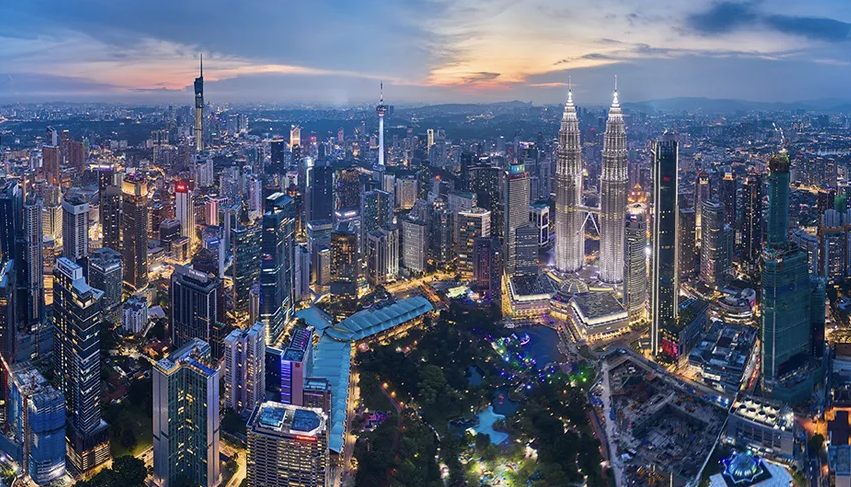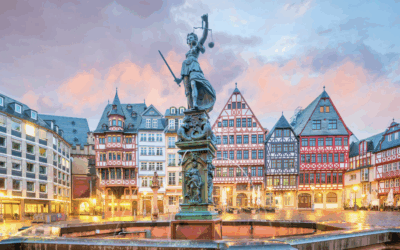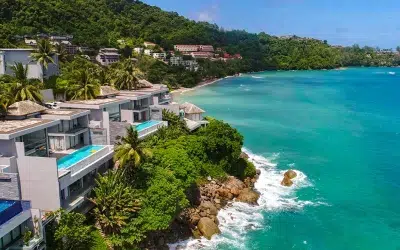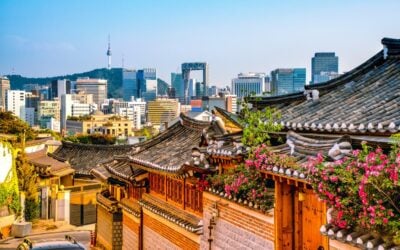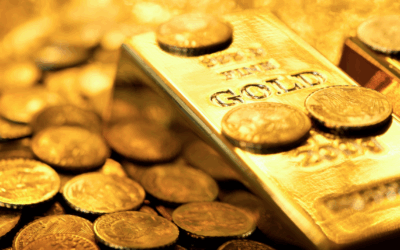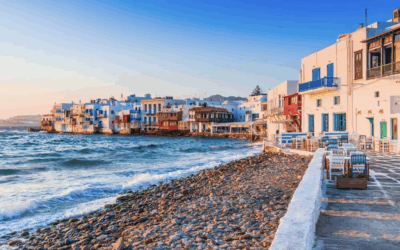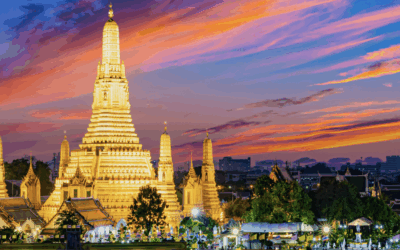Welcome to Kuala Lumpur, the dynamic capital of Malaysia that masterfully blends its rich cultural heritage along with the convenience of modern life.
This vibrant city is a melting pot of Malay, Chinese, and Indian cultures, offering expats an unparalleled blend of traditions, cuisines, and experiences.
From its iconic Petronas Twin Towers standing tall against a backdrop of lush greenery to its sprawling street markets and world-class infrastructure, Kuala Lumpur is a city that truly has it all.
Below, we’ll explore everything you need to know about living in KL as a foreigner, from its diverse neighborhoods to the cost of living, along with some practical tips to help you make the most of your expat experience here.
Why Kuala Lumpur is Good for Expats
Kuala Lumpur is a city that caters to a vast array of different lifestyles, offering something for everyone.
That might sound cliche, but it’s indeed true for Malaysia’s largest city. Single professionals, families with children, and retirees alike will all that that KL has opportunities and amenities to suit your needs.
For expats specifically, KL offers more than just a picturesque skyline. The city boasts a high living standard at a mere fraction of the cost of Western cities, world-class healthcare and an international community that makes settling in remarkably easy.
Pros of Living in Kuala Lumpur
- Cultural Diversity: KL is a multicultural city where Malay, Chinese, and Indian communities coexist, resulting in a vibrant cultural scene and incredible food.
- Affordable Lifestyle: The cost of living is significantly lower than in Western cities, allowing expats to enjoy a comfortable lifestyle on a modest budget.
- Culinary Delights: From street food to high-end dining, KL is a paradise for food lovers.
- Expat-Friendly Environment: English is widely spoken, making it easier for newcomers to integrate.
- Convenience of Travel: Located in the heart of Southeast Asia, and sharing borders with four other countries, KL is a convenient base for exploring the region.
Challenges of Living in Kuala Lumpur
- Tropical Climate: The year-round heat and humidity can take some getting used to, especially for those who aren’t to tropical weather.
- Traffic Congestion: KL’s traffic can be heavy, and public transport, while available, is often crowded. The city’s metro system just isn’t as developed compared to SIngapore or Bangkok.
- Cultural Adjustments: Obviously, Malaysia’s culture is different from countries in the west – and even most of East/Southeast Asia for that matter. Adapting to local customs and traditions may require some patience on your end.
Best Neighborhoods to Live in KL
With over eight million people living in its metro area, Kuala Lumpur is a rather large city. This naturally means plenty of different areas to live, each of them have their own distinct character.
Here’s a quick overview of six of Kuala Lumpur’s most popular places to live as an expat. You may also be interested in reading our complete KL neighborhood guide, which covers the city’s different locales in even greater detail.
Kuala Lumpur City Center (KLCC)
KLCC is the bustling heart of Kuala Lumpur, famous for its iconic Petronas Twin Towers, luxury shopping at Suria KLCC mall, and a vibrant nightlife scene.
The area is perfect for professionals and singles who enjoy the fast-paced energy of city life. Rooftop bars and fine-dining restaurants make KLCC a hotspot for socializing and networking.
In addition to its urban appeal, KLCC offers pockets of tranquility like KLCC Park, where joggers, families, and picnickers can unwind amidst the skyscrapers.
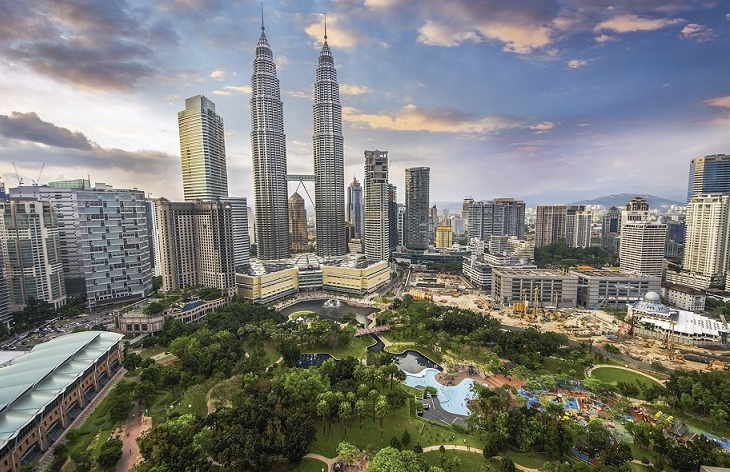
Located directly in the middle of the city, KLCC Park serves as an oasis for families, tourists, and indeed people who are simply walking through.
The park’s walking paths and fountains provide a refreshing escape from the hustle and bustle of this central business district (CBD).
However, despite being the absolute city center, most locals don’t live in KLCC and often choose another neighborhood. You’ll find that it’s almost completely dead at night too!
Mont Kiara
Mont Kiara is a haven for expat families, known for its luxury condos, excellent quality of international schools, and a strong sense of community.
Beyond its residential appeal, Mont Kiara is also a hub for fitness and wellness enthusiasts. The neighborhood hosts yoga studios, fitness centers, and weekly farmers’ markets that bring the community together.
Close proximity to Desa Park City adds another layer of charm, offering even more green spaces and recreational activities for anyone living in Mont Kiara to enjoy.
Bangsar
Bangsar is the go-to neighborhood for expats who enjoy a lively social scene. It’s packed with trendy bars, diverse restaurants, and boutique shopping options.
The area’s casual yet sophisticated vibe makes it a favorite among young professionals and couples.
What sets Bangsar apart is its mix of modernity and tradition. The neighborhood is dotted with charming local markets and heritage buildings, offering residents a glimpse into Malaysia’s rich history.
Bukit Bintang
Located within KLCC but often referred to seperately, Bukit Bintang is the Times Square of Kuala Lumpur, and for good reason.
This bustling district is a shopper’s paradise, home to upscale malls like Pavilion KL as well as vibrant street markets. It’s a hotspot for entertainment, with everything from cinemas and karaoke bars to street food stalls that serve some of the best local dishes.
During the day, you can explore Bukit Bintang’s malls and markets or enjoy a relaxing spa session.
At night, the district comes alive with neon lights, live music, and rooftop bars offering city views. It’s a neighborhood that truly never sleeps.
Bukit Damansara
Bukit Damansara, also known as Damansara Heights, is one of Kuala Lumpur’s most prestigious addresses and a favorite among affluent locals and expats alike.
The area is known for its luxurious property, including spacious bungalows, landed homes, and high-end condos.
Damansara is one of the most expensive areas in Kuala Lumpur – rivaled only by KLCC. You won’t find many houses in the city center though. Indeed, Damansara is prime for landed property.
Nestled just a 15-minute drive from the city center, this upscale neighborhood offers a perfect blend of exclusivity and convenience, which makes it a solid excellent choice for expats seeking a quieter lifestyle without sacrificing accessibility to the city’s amenities.
Taman Tun Dr Ismail (TTDI)
TTDI is a gem for those who love nature and a quieter pace of life. Known for its leafy streets and close proximity to parks like Bukit Kiara, TTDI is ideal for outdoor enthusiasts.
It offers a mix of traditional Malaysian charm and modern conveniences, with plenty of local eateries and boutique shops.
TTDI is also a cultural hotspot, hosting community events and festivals that bring residents together.
The area’s laid-back vibe and strong sense of community make it a favorite among expats looking for a more authentic Malaysian experience without sacrificing much convenience.
Cost of Living in Kuala Lumpur
Kuala Lumpur is one of the most affordable cities for expats in Asia, offering excellent value for money.
It’s far cheaper than nearby Singapore, and in fact, on average cheaper than Thailand which is generally less developed. Here’s a breakdown of typical expenses in KL:
- Accommodation: A one-bedroom apartment in the city center costs around RM1,500–2,000 ($300-$450) per month, while a three-bedroom unit in an expat-friendly area can range from RM5,000–7,000 ($1,000-$1,500). Luxury condos with pools and gyms are also widely available at reasonable rates.
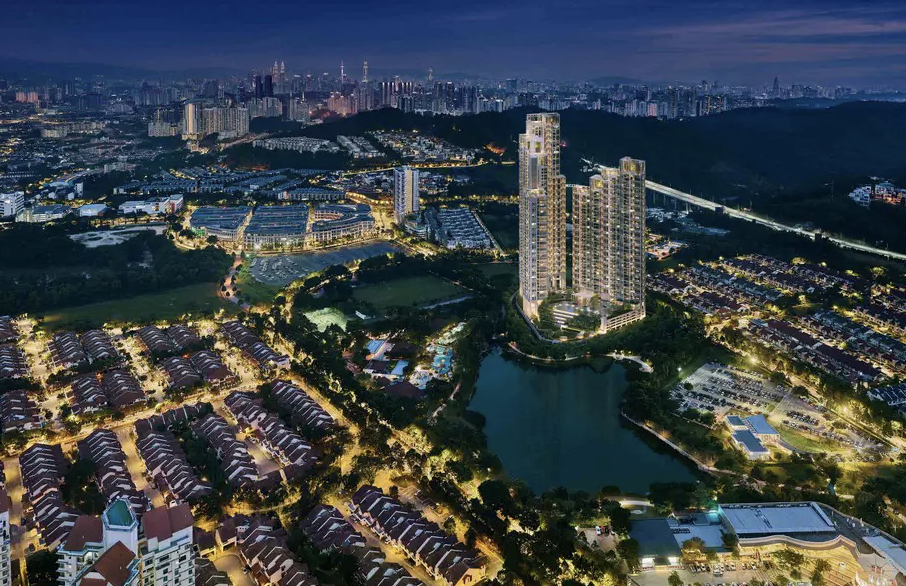
Desa Park City is a planned area in KL’s suburbs. Expats and local families alike choose this neighborhood for its comfort and lower prices.
- Food: Eating out is incredibly affordable. A meal at a local restaurant costs around $5, while a three-course meal for two at a mid-range restaurant is about $30. Groceries, especially local produce, are also rather cheap in general – that is, unless you’re buying imported food.
- Transport: Public transport is cheap, with fares starting at RM1. Grab (the local ride-hailing app) is widely used and affordable. However, owning a car may be necessary for families or anyone living in Kuala Lumpur’s suburbs.
- Healthcare: Malaysia offers high-quality healthcare at a fraction of the cost in Western countries. A visit to a general practitioner costs around $20, and private health insurance is recommended for more comprehensive coverage.
Malaysian Residence: MM2H and PVIP Visas
For expats considering Kuala Lumpur as their new home, the Malaysia My Second Home (MM2H) visa program is a fantastic option to secure long-term residency here.
This visa program was designed to attract foreigners who wish to live in Malaysia for an extended period. MM2H visa provides successful applicants with a renewable visa, thus granting unlimited flexibility to live and travel in Malaysia.
While the MM2H visa program is highly attractive, it’s worth noting that recent changes have made the requirements stricter than before. Applicants must now meet higher income and deposit thresholds compared to previous years.
For instance, a minimum fixed deposit of RM500,000 is required for the silver tier, along with an additional RM600,000 worth of real estate.
You may be interested in reading our guide about the MM2H Visa if you’re looking to stay in Malaysia long-term. It’s also worth considering Malaysia’s Premium Visa Program (PVIP) that caters to high-income individuals with different qualification criteria
Practical Tips for Expats
- Nature and Parks: Explore the Bukit Kiara hiking trails, Perdana Botanic Gardens, or the Eco Park for a breath of fresh air.
- Shopping: From luxury malls like Pavilion KL to bustling street markets in Chinatown, KL is a shopper’s paradise.
- Cultural Sites: Visit the Batu Caves, Thean Hou Temple, and Masjid Jamek to experience the city’s rich heritage.
- Nightlife: Rooftop bars like Marini’s on 57 offer stunning views of the city skyline, while areas like Changkat Bukit Bintang are perfect for a lively night out.
- Language: English is widely spoken in KL, making it easy for expats to communicate. However, learning some basic Malay phrases can be helpful.
- Community: KL has a thriving expat community. Joining social groups or attending networking events can help you settle in and make friends.
Should You Move to KL?
Kuala Lumpur effortlessly combines the best of both worlds: the energy and convenience of a modern metropolis with the charm and warmth of a culturally rich city.
Its affordability, world-class amenities, and welcoming expat community make it one of the most desirable destinations for those seeking a better quality of life in Asia.
Even though no city is without major challenges, Kuala Lumpur’s vibrant neighborhoods, diverse culinary scene and endless leisure arguably make up for them.
So whether you’re drawn to the fast-paced lifestyle of KLCC, the family-friendly vibe of Mont Kiara, or the tranquil greenery of Bukit Damansara, you’ll find that Kuala Lumpur truly offers something for everyone.
If you’re ready to make the move, Kuala Lumpur is ready to welcome you with open arms – and perhaps a plate of nasi lemak too!
FAQs: Living in Kuala Lumpur, Malaysia
What Are the Top Neighborhoods in Kuala Lumpur?
Four of the best neighborhoods in KL for expats include:
- KLCC (Kuala Lumpur City Center): Perfect for professionals and singles who enjoy a fast-paced city lifestyle with access to luxury shopping, rooftop bars, and iconic landmarks like the Petronas Twin Towers.
- Mont Kiara: Ideal for families, offering upscale condominiums, international schools, and a strong sense of community.
- Bangsar: A lively area with trendy bars, diverse restaurants, and boutique shopping, favored by young professionals and couples.
- Bukit Damansara: Property prices rank among KL's most expensive, although expats often find the premium worth it for the quality of life and exclusivity the neighborhood provides
Is Kuala Lumpur a Cheap City ?
While "cheap" is relative, Kuala Lumpur is one of the most affordable cities in Asia for expats. A one-bedroom apartment in the city center costs around RM1,500-2,000 ($300-$450) per month, while a three-bedroom unit in an expat-friendly area ranges from RM5,000–7,000 ($1,000-$1,500). Dining out is also budget-friendly, with meals at local restaurants costing around $5.
Can I Become a Malaysian Citizen?
Yes, although Malaysian citizenship is a challenging process, especially for foreigners. Malaysia doesn't typically allow dual citizenship, and naturalization requires a long-term commitment, including residing in the country for at least 10 years and meeting strict criteria.
For most expats, you'll find that securing a long-term visa or residence permit, such as the Malaysia My Second Home (MM2H) program, is a more realistic option.
What Language Do They Speak in Kuala Lumpur?
The official language of Malaysia is Malay (Bahasa Malaysia), but English is widely spoken, especially in Kuala Lumpur. English is commonly used in business, education, and daily life, making it easier for expats to navigate the city.
Other languages like Chinese and Tamil are also very commonly spoken due to Malaysia’s multicultural populace.
Is Kuala Lumpur Safe for Foreigners?
Generally, Kuala Lumpur is rather safe for foreigners, but like any major city, it has areas where caution is advised. It's indeed considered less-safe on average compared to Singapore or even Bangkok.
Petty crime like bag-snatching and pickpocketing can occur, particularly in tourist-heavy areas like KLCC and KL Sentral. It’s best to avoid walking alone in dark or unfamiliar areas and always remain vigilant.

